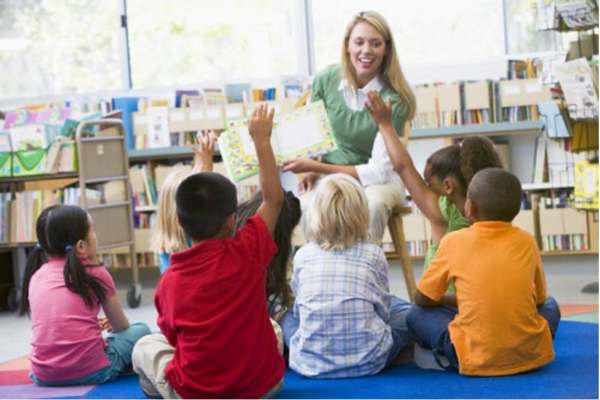Emotional Education in School

Education is power. It’s the most powerful weapon you can possess. In fact, it makes you who you are. That’s why experts recently recognized that emotional intelligence should be taught in classrooms. Emotional education seems to be crucial in creating free, honorable, and fair-minded human beings.
It seems that if boys and girls receive a comprehensive emotional education, they’ll be better able to develop a mindset that respects gender differences and equality. Furthermore, inclusive education is a universal right. It’s a system that’s based on equality and non-discrimination. This way, children can reach their full potential at both a cognitive and socio-emotional level.
Emotional education, every child’s right
The education system must be adapted to suit everyone’s needs. That’s why emotional intelligence must be included in any comprehensive education. Emotional intelligence is defined as a set of emotional and social skills. If these skills are developed under conditions of gender equality, the child develops a resilient and well-rounded personality.
When you know about emotions, you get more out of your education. Thus, when children learn emotional intelligence, they develop inclusive mindsets. This way of thinking promotes acceptance and tolerance, regardless of gender.

Emotional intelligence as a tool in school
Emotional intelligence can be a great tool to teach values. Thus, some authors believe it acts as an intermediary on the outcomes of cognitive skills and academic performance.
Some writers have studied how emotional intelligence affects behavior. For instance, they believe that students’ social habits and impulsivity change depending on whether they have low or high emotional intelligence.
Students with low emotional intelligence tend to exhibit anti-social behaviors. This is because they have higher rates of impulsivity and fewer social habits.
Students with higher emotional intelligence usually develop more positive interpersonal bonds. Furthermore, they’re less likely to argue with their friends.
In addition, people who develop emotional intelligence as a child tend to have more rewarding habits and experiences in adulthood. Consequently, they’re better able to cope with life changes and have an increased level of psychological well-being.
Emotional education in elementary school
Childhood is the most sensitive time when it comes to personality development. In fact, in Spanish primary education, it’s considered extremely important for all students’ learning capabilities to be taken into account.
Creating constructive relationships that are based on equality prevents a child from acquiring either an under or over-valued self-concept. Indeed, such unsuitable self-concepts can trigger gender violence.

Some models based on emotional intelligence
- Goleman’s competency model (1995)
- Bar-On model of emotional-social intelligence (1997)
- Model of the four branches of Salovey and Myer (1990)
Conclusions on emotional education in school
The origins of gender-based violence are both social and cultural. It’s based on patriarchal gender stereotypes. These stereotypes considered women as subordinate to men. In fact, even women’s fundamental rights, as in “the right to have rights” were disregarded.
To put an end to this problem, we need to get to the bottom of it. In childhood, gender differences begin to occur, which can then lead to gender violence. Therefore, this is where education plays a major role.
All cited sources were thoroughly reviewed by our team to ensure their quality, reliability, currency, and validity. The bibliography of this article was considered reliable and of academic or scientific accuracy.
- Fernández de la Cruz, M., Blázquez Alonso, M., Moreno Manso, J. M., García-Baamonde Sánchez, M. E., Guerreo Barona, E., & Pozueco Romero, J. M. (2016). La educación emocional como recurso para la prevención de la violencia de género en niños/as de educación de primaria. In Mujeres e investigación. Aportaciones interdisciplinares: VI Congreso Universitario Internacional Investigación y Género (2016), p 189-206. SIEMUS (Seminario Interdisciplinar de Estudios de las Mujeres de la Universidad de Sevilla).
- Blázquez, M., Moreno, J. M. y García-Baamonde, M. E. (2009): “Inteligencia emocional como alternativa para la prevención del maltrato psicológico en la pareja”. Anales de Psicología, 25 (2), (250-260)
- Gairín , J. (1994): “Los conflictos”. Cuadernos de Pedagogía, 222, 22- 25.
- Grewal, D., & Salovey, P. (2005): “Feeling Smart: The Science of Emotional Intelligence”. American Scientist, 93, (330-339)
- Mayer, J. D., & Salovey, P. (1997). What is emotional intelligence. Emotional development and emotional intelligence: Educational implications, 3, 31.
- Fernández Rodicio, C. I. (2011). La inteligencia emocional como estrategia educativa inclusiva.
- Arnáiz, P. (2003): Educación inclusiva: Una escuela para todo. Málaga, Aljibe.
- Kobasa, S. C., Maddi, S. R., & Puccetti, M. C. (1982). Personality and exercise as buffers in the stress-illness relationship. Journal of behavioral medicine, 5(4), 391-404.
- Cassà, È. L. (2007). Educación emocional: Programa para 3-6 años. WK Educación.
- Petrides, K. V., Frederickson, N. & Furnham, A. (2004): “The role of trait emotione intelligence in academic performance and deviant behaviour at school”. Personality and Indvidual Differences, 36, 2, (277-293)
- Mestre, J.M., Guil, R., Lopes, P., Salovey P. & Gil-Olarte, P. (2006): “Emotional Intelligence and social and academia adaptation to school.” Psicothema, 18, (112-117)
- Ciarrochi, J., Chan, A. & Bajgar, J. (2001): “Measuring emotional intelligence in adolescents”. Personality and Individual Differences, 31 (7), (1105-1119)
- Alzina, R. B. (2008). Educación emocional para la convivencia: las competencias emocionales. In Educación emocional y convivencia en el aula (pp. 143-162). Subdirección General de Información y Publicaciones.
- Berrocal, P. F., & Aranda, D. R. (2008). La educación de la inteligencia emocional desde el modelo de Mayer y Salovey. In Educación emocional y convivencia en el aula (pp. 163-178). Subdirección General de Información y Publicaciones.
- Humphrey, N., Curran, A., Morris, E., Farrell, P., & Woods, K. (2007). Emotional intelligence and education: A critical review. Educational Psychology, 27(2), 235-254.
- Repetto, E. (2003). La competencia emocional e intervenciones para su desarrollo. Modelos de orientación e intervención psicopedagógica, 2, 453-482.
- Barr, J. J., & Higgins-D’Alessandro, A. (2007). Adolescent empathy and prosocial behavior in the multidimensional context of school culture. The Journal of Genetic Psychology, 168(3), 231-250.
- Amorós, C. (1990). Violencia contra las mujeres y pactos patriarcales.
- Hernando Gómez, Á. (2007). La prevención de la violencia de género en adolescentes: una experiencia en el ámbito educativo.
- Echeita Sarrionandia, G., & Ainscow, M. (2011). La educación inclusiva como derecho: marco de referencia y pautas de acción para el desarrollo de una revolución pendiente. Tejuelo: Revista de Didáctica de la Lengua y la Literatura.
This text is provided for informational purposes only and does not replace consultation with a professional. If in doubt, consult your specialist.








